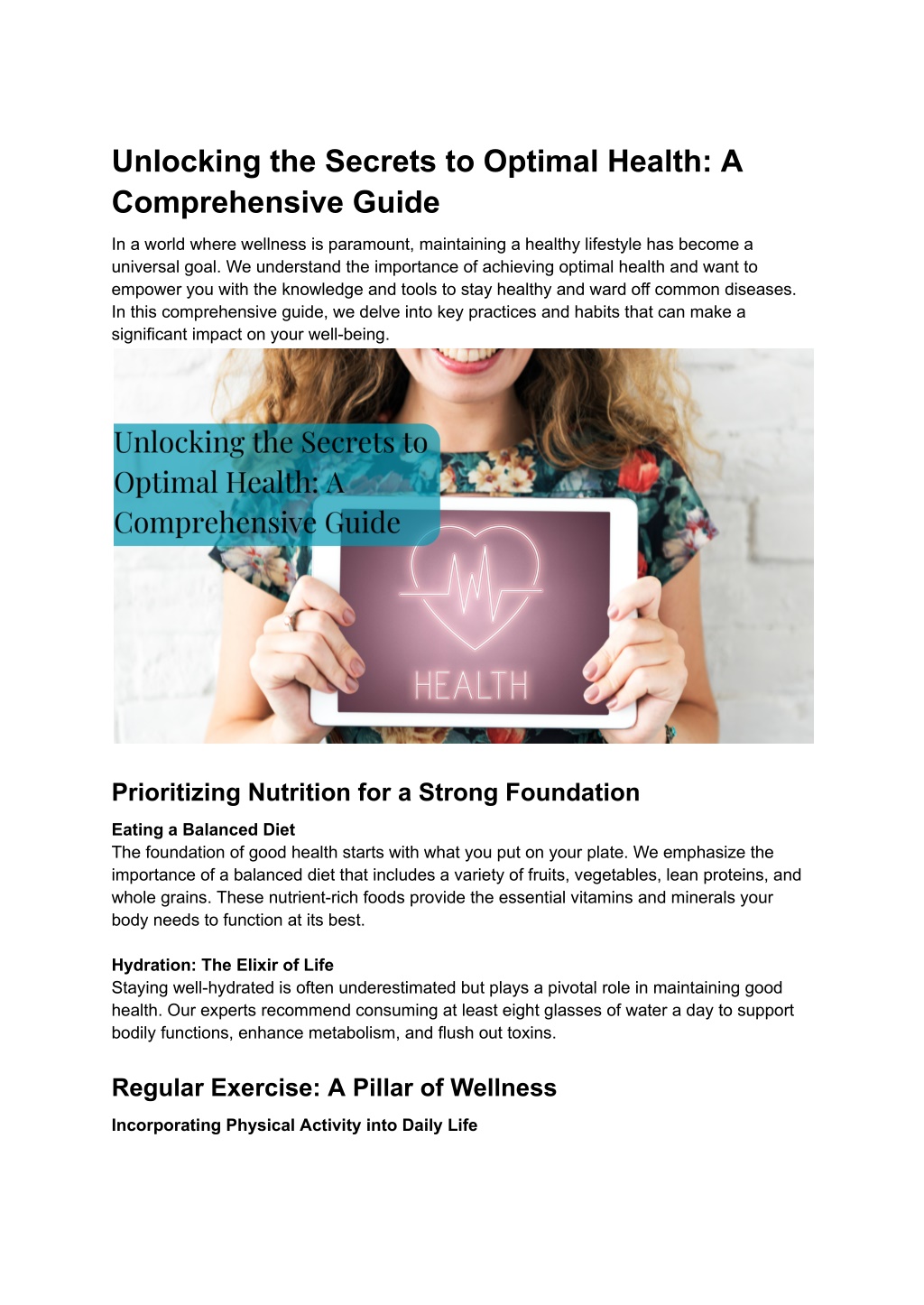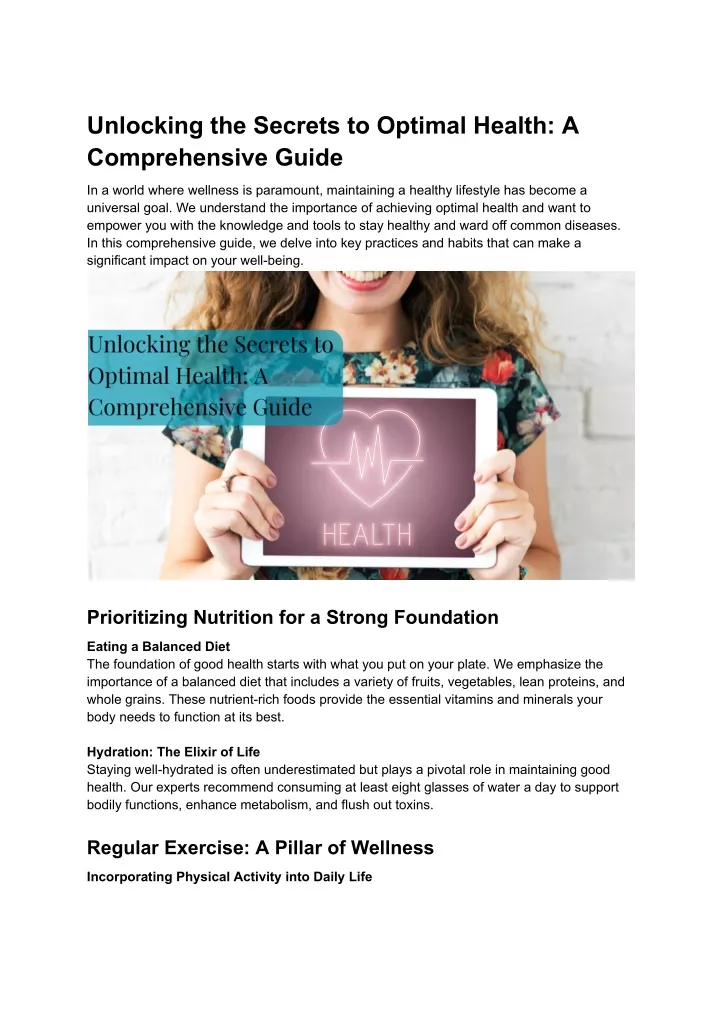Discover why is nutrition important for your overall health and well-being. Nutrition is important because it provides the body with essential nutrients necessary for growth, development, and overall health. A well-balanced diet plays a crucial role in maintaining optimal health and preventing various diseases.
Good nutrition provides the body with energy, essential vitamins, minerals, and micronutrients that support the proper functioning of bodily systems. It helps in building a strong immune system, maintaining a healthy weight, and promoting overall well-being. A nutritious diet also contributes to a better mood, improved cognitive function, and increased productivity.
On the other hand, poor nutrition can lead to nutrient deficiencies, weakened immune systems, an increased risk of chronic diseases, and impaired physical and mental development. Therefore, it is crucial to prioritize nutrition and make informed choices to support a healthy lifestyle.

Credit: scribepublications.com.au
The Fundamentals Of Nutrition
Understanding the fundamentals of nutrition is vital for maintaining a healthy lifestyle. Nutrition is the process of providing the body with the necessary nutrients to support overall health and well-being. By consuming a balanced diet, individuals can ensure that their body receives essential vitamins, minerals, and other vital nutrients.
Macronutrients And Micronutrients
Nutrition consists of two main categories of nutrients: macronutrients and micronutrients.
- Macronutrients: These are the nutrients that the body requires in large amounts. They include carbohydrates, proteins, and fats. Carbohydrates provide energy, proteins are essential for tissue repair and growth, while fats play a role in supporting cell function and providing energy reserves.
- Micronutrients: These are the smaller-quantity nutrients that the body needs. They include vitamins and minerals. Micronutrients play a crucial role in supporting various bodily functions, such as immune system health, bone strength, and energy production.
The Role Of Nutrition In Overall Health
An essential component of maintaining general health and well-being is nutrition.
- Balanced Diet: A balanced diet rich in essential nutrients helps maintain optimal body function and supports growth and development.
- Disease Prevention: Proper nutrition can help prevent various diseases, including heart disease, diabetes, and certain types of cancer.
- Energy Levels: Nutrient-rich foods provide the energy needed for daily activities, exercise, and overall vitality.

Credit: www.slideserve.com
Understanding The Impact Of Nutrition
Understanding the impact of nutrition is crucial, as it plays a vital role in maintaining overall health and well-being. A balanced diet provides essential nutrients and helps prevent chronic illnesses, boosts the immune system, and improves cognitive function.
Understanding the impact of nutrition is crucial in order to recognize the significance of maintaining a healthy diet. Nutrition plays a vital role in both our physical and mental well-being.
Physical Well-being
Good nutrition is the foundation of physical well-being. When we provide our bodies with the necessary nutrients, we are strengthening our immune system, enhancing our energy levels, and promoting optimal bodily functions. A well-balanced diet, rich in vitamins, minerals, proteins, and carbohydrates, supports healthy growth and development, improves digestion, and aids in weight management. Moreover, a nutritious diet helps prevent chronic diseases such as diabetes, heart disease, and certain types of cancer. By fueling our bodies with the right nutrients, we are equipping ourselves with the tools needed to lead an active and fulfilling life.
Mental Well-being
Just as the body requires fuel to function properly, so does the mind. Nutrition also has a significant impact on our mental well-being. Consuming a nutritious diet helps maintain the balance of neurotransmitters in the brain, contributing to improved mood and mental clarity. Adequate intake of essential nutrients such as omega-3 fatty acids, B vitamins, and antioxidants supports brain function, enhances memory, and reduces the risk of mental health disorders such as depression and anxiety. Additionally, a healthy diet can improve sleep quality, increase focus and concentration, and boost overall cognitive performance. By nourishing our bodies with the right nutrients, we are nurturing our minds and promoting a positive mental state.
In conclusion, understanding the impact of nutrition is paramount to recognizing the importance of maintaining a healthy diet. By prioritizing our physical and mental well-being through proper nutrition, we can reap the benefits of improved overall health and lead a fulfilling life. Remember, the foods we consume are not just a source of pleasure but also the building blocks for a healthy mind and body. So, make wise choices and nourish yourself for a better and brighter future.
Exploring Key Nutrients
Understanding the importance of key nutrients in our diet is crucial for overall well-being and health.
Vitamins And Minerals
Vitamins and minerals play a vital role in maintaining various bodily functions.
Proteins And Fats
Proteins are essential for building and repairing tissues, while fats provide energy and support cell function.

Credit: medium.com
Nutrition And Disease Prevention
When it comes to maintaining good health, proper nutrition plays a crucial role in disease prevention. The food we consume directly impacts our overall well-being and can either support or harm our body functions.
Heart Disease And Hypertension
Heart disease and hypertension are serious conditions that are often linked to poor dietary choices. Consuming a diet high in saturated fats, salt, and processed foods can increase the risk of developing heart-related issues.
Diabetes And Metabolic Disorders
Diabetes and metabolic disorders are on the rise due to the prevalence of unhealthy eating habits. A diet rich in sugar, refined carbohydrates, and unhealthy fats can lead to insulin resistance and metabolic imbalances.
Nutrition And Energy
Nutrition and energy are closely intertwined, as the food we consume directly impacts our body’s ability to function and perform various tasks.
Impact On Energy Levels
Nutrition plays a crucial role in determining our energy levels throughout the day. The quality of our diet can significantly affect how energized and alert we feel.
Fueling Physical Activity
Proper nutrition is essential for fueling physical activity and optimizing performance. The right balance of carbohydrates, proteins, and fats can enhance endurance and strength.
The Influence Of Nutrition On Weight Management
Balanced Diets
A balanced diet plays a vital role in weight management. Eating a variety of healthy foods in the right proportions provides essential nutrients while controlling calorie intake.
The Role Of Exercise
Exercise is a crucial component of weight management. It promotes calorie burning, builds lean muscle, and contributes to a healthy metabolism, all of which aid in weight control.
Nutrition And Aging
As we age, our nutritional needs change, and it becomes increasingly important to prioritize a well-balanced diet to support overall health and well-being. Adequate nutrition plays a crucial role in promoting healthy aging, maintaining cognitive function, and reducing the risk of chronic diseases commonly associated with aging.
Nutritional Needs In Different Life Stages
Proper nutrition is vital at every stage of life, but the specific nutritional needs vary as individuals age. Children and adolescents require essential nutrients to support growth and development. Adults need a balanced diet to maintain energy levels and support overall health. In contrast, older adults may require fewer calories, but nutrient-dense foods become even more crucial to support aging bodies and prevent malnutrition.
Maintaining Cognitive Function
Nutrition plays a key role in maintaining cognitive function as individuals age. Diets rich in antioxidants, omega-3 fatty acids, and vitamins such as B6, B12, and folate have been linked to improved cognitive health and a reduced risk of cognitive decline. Proper nutrition also supports brain health and can help prevent conditions such as dementia and Alzheimer’s disease.
Addressing Common Nutritional Myths
For one to remain healthy and happy overall, nutrition is essential. Addressing common nutritional myths is essential for understanding the importance of proper nutrition. By debunking misconceptions, individuals can make informed choices and adopt healthier eating habits for a better quality of life.
Addressing Common Nutritional Myths
When it comes to our health, nutrition plays a vital role in ensuring that our bodies function properly. However, with so much information floating around about what we should and shouldn’t be eating, it’s easy to fall into the trap of believing common nutritional myths. In this section, we will debunk some of the most prevalent myths surrounding nutrition and provide you with the truth, backed by scientific evidence.
The Truth About Carbs and Fats
Contrary to popular belief, not all carbs and fats are bad for you. In fact, our bodies need both of these macronutrients to function optimally. Carbohydrates provide our bodies with a source of energy, and they are found in foods such as fruits, vegetables, and whole grains. However, it’s important to distinguish between “good” and “bad” carbs. Good carbs, also known as complex carbs, are slow-digesting and provide a steady release of energy throughout the day. Examples of good carbs include quinoa, brown rice, and sweet potatoes. On the other hand, bad carbs, also known as simple carbs, are found in processed foods and sugary snacks. These carbs are quickly digested, leading to spikes in blood sugar levels and energy crashes. Avoiding or minimizing the consumption of bad carbs can help maintain stable energy levels and promote overall health.
Similarly, fats are often misunderstood. While it’s true that certain types of fats can contribute to weight gain and other health issues, not all fats are created equal. Unsaturated fats, such as those found in avocados, nuts, and olive oil, are considered healthy fats and can actually be beneficial for heart health. On the other hand, saturated fats, which are commonly found in red meat and full-fat dairy products, should be consumed in moderation. Finally, trans fats, often found in processed and fried foods, should be avoided altogether, as they are known to increase the risk of heart disease. Remember, when it comes to fats, quality matters more than quantity.
Debunking Diet Fads
In the quest for weight loss and optimal health, many people turn to diet fads that promise quick results. However, these diets often rely on restrictive eating patterns or the elimination of entire food groups, which can lead to nutrient deficiencies and unsustainable habits. Let’s debunk some of the most common diet fads and shed light on their potential drawbacks:
1. The Low-Carb Craze: Low-carb diets have gained popularity for their potential to promote weight loss. While they may indeed lead to initial weight loss, they can be difficult to sustain in the long term. It takes carbohydrates to sustain healthy physical functioning and to provide energy. Instead of cutting out carbs entirely, opt for the “good” ones mentioned earlier and consume them in moderation.
2. Juice Cleanses: Juice cleanses involve consuming only fruit or vegetable juices for a set period of time. While this may seem like a quick way to detoxify your body, it is not a sustainable or healthy practice. Juices lack fiber, essential proteins, and healthy fats that our bodies need for proper functioning. Instead of relying solely on juice, incorporate a variety of whole fruits and vegetables into your diet to reap their full nutritional benefits.
3. Eliminating Entire Food Groups: Diets that exclude entire food groups, such as gluten or dairy, can be unnecessarily restrictive unless there is a medical reason to do so. It’s important to note that our bodies require a balanced variety of nutrients, including carbohydrates, proteins, fats, vitamins, and minerals. Unless you have a specific dietary restriction, it is best to consume a well-rounded diet that includes foods from all food groups.
By understanding the truth about carbs, fats, and debunking diet fads, you can make informed decisions about your nutrition. Remember, a well-balanced diet that includes a wide variety of whole, unprocessed foods is key to achieving optimal health.
Frequently Asked Questions On Why Is Nutrition Important
What Are 3 Reasons Why Nutrition Is Important?
Nutrition is important for overall health, energy, and disease prevention. It supports proper growth and development, strengthens the immune system, and boosts brain function. A balanced diet provides essential nutrients that are vital for the body’s optimal functioning.
What Are 3 Benefits Of Nutrition?
Nutrition provides energy, supports overall health, and helps maintain a healthy weight. It also boosts the immune system, improves mood, and reduces the risk of chronic diseases. Additionally, it supports growth and development, enhances athletic performance, and promotes healthy aging.
What Is Nutrition And What Is Its Importance?
Nutrition is the study of how food affects our body’s health and functioning. It is vital for growth, development, and overall well-being. Good nutrition provides essential nutrients to support bodily functions and maintain optimal health. Without proper nutrition, our bodies may become susceptible to diseases and deficiencies.
Why Is Nutrition Necessary?
Proper nutrition is necessary to fuel our bodies, support our overall health, and prevent disease. Nutrients play vital roles in our bodily functions.
Conclusion
Making nutrition a priority is crucial to preserving optimum health and well-being. It plays a vital role in supporting our immune systems, enhancing energy levels, improving cognitive function, and preventing chronic diseases. By making informed choices about what we eat, we can empower ourselves to lead healthier, more fulfilled lives.
Never forget that reaching our greatest potential requires a balanced diet. For a better tomorrow, make an investment in your nutrition today.

